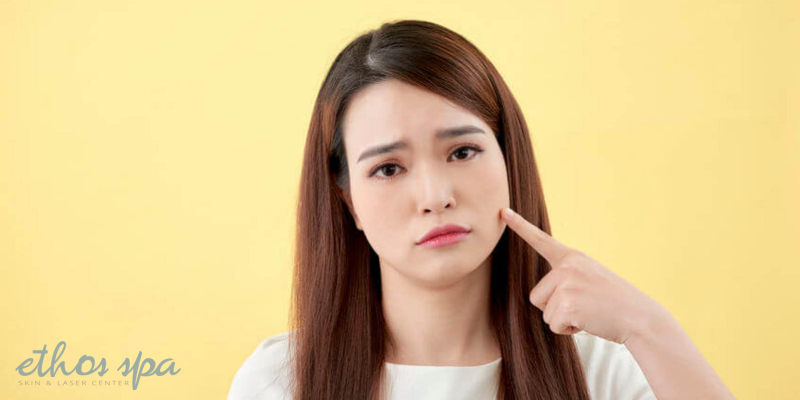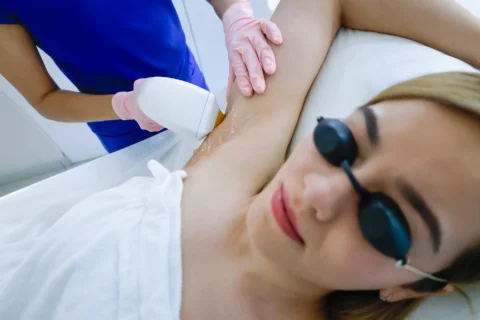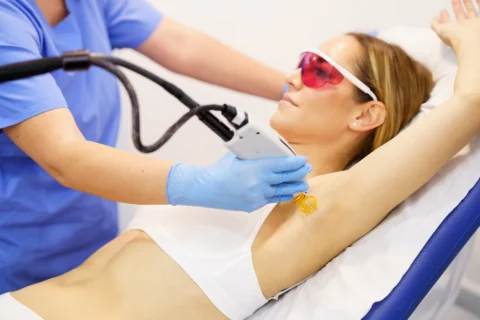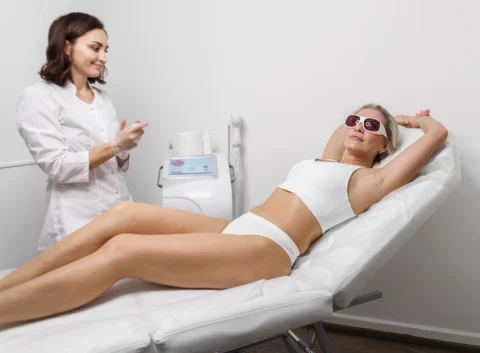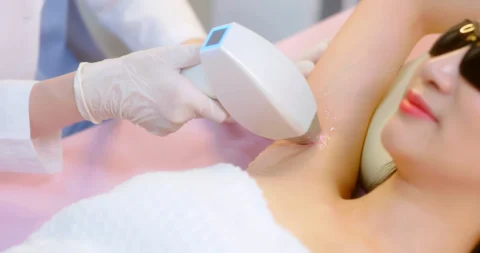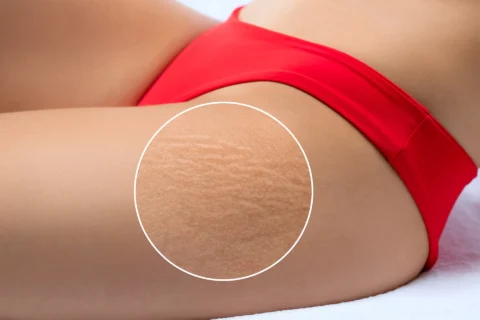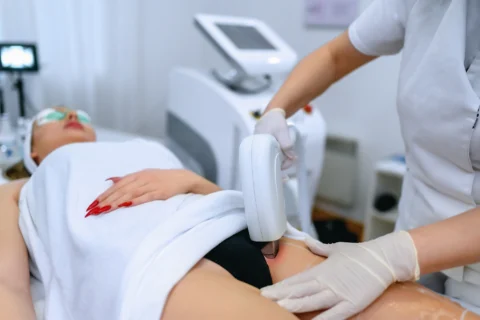Chin hair in women typically appears as thin and faint strands that some people call “peach fuzz.” But sometimes, a rogue chin hair that’s thick enough to belong in a man’s beard appears. While the occasional appearance of thick chin hair is normal, it’s better to consult a physician if this happens too often.
So what are the possible causes of sudden chin hair appearance in women? While the appearance of coarse chin hair because of male hormones is normal most of the time, there are also underlying causes for the hormonal imbalance in the body, such as polycystic ovary syndrome, adrenal or ovarian tumors, Cushing syndrome, diabetes, and pregnancy.
5 Possible Reasons for Chin Hair Growth in Women
Hirsutism is a common condition that causes women to develop dark and thick hair in their face, chest, and back. According to a study published in August 2020, around 10% of American women suffer from this condition.
The main cause of hirsutism is the body’s overproduction of androgen and testosterone. Cases of hirsutism vary widely because the reason for hormonal imbalance in women may have underlying causes, such as the following:
1. Polycystic Ovary Syndrome
Polycystic ovary syndrome (PCOS) is a condition that affects around 10% of women in their childbearing age. It refers to the growth of cysts in the ovaries that prevent the egg cells from maturing, which leads to different fertility issues.
Aside from affecting a woman’s chances of getting pregnant, PCOS also impacts the body’s hormone levels. This causes a woman to gain weight, have irregular periods, develop acne, and experience coarse hair in androgen-dependent areas, such as the chin, abdomen, butt, upper thighs, and low back.
Treatments for PCOS include lifestyle changes and several medications for menstrual cycle regulation, ovulation, and excessive hair growth reduction.
2. Adrenal or Ovarian Tumors
The appearance of ovarian tumors also increases the body’s production of androgen. Although they are often asymptomatic, some patients with ovarian tumors experience irregular vagina bleeding and pelvic pain. Regular checkups are necessary for the early detection of ovarian tumors. The good news is that most ovarian tumors are benign and removable through surgery.
Aside from the ovaries, tumors may also grow on the adrenal glands found at the top of each kidney. Like ovarian tumors, adrenal growths are also asymptomatic most of the time. If these tumors are responsible for the production of excess hormones in the body, a person may experience weight gain, bruising, acne, high sugar level, high blood pressure, and many other symptoms.
3. Cushing Syndrome
Cushing syndrome (also called “hypercortisolism”) occurs when the body is exposed to high cortisol levels for an extended period. Cortisol is an important hormone in the body that regulates blood pressure, assists in heart and blood vessel function, and reduces inflammation. But overproduction of cortisol in the body leads to Cushing syndrome which is accompanied by several symptoms and complicated health risks.
Aside from the appearance of stray thick hair in women, patients with Cushing syndrome may also develop the following symptoms:
- Fatty hump between shoulders
- Rounded face
- Purple stretch marks on the skin
- Bruises
- Acne
Treatment for Cushing syndrome helps the body return to its normal appearance, but it must be done early to achieve better recovery chances. This condition is treated using medications that control the adrenal glands’ cortisol production.
4. Diabetes
Diabetes is a condition caused by the body’s resistance to insulin – a hormone that converts sugar into energy. Insulin resistance also raises the body’s testosterone, resulting in the development of more facial and body hair. Some symptoms of diabetes and insulin resistance also include body weakness and fatigue.
Treatments for insulin resistance and diabetes include exercise, a healthy diet, and medication. Since hirsutism is only a symptom of insulin resistance, additional treatment won’t be necessary – hair growth automatically returns to normal when the body’s insulin levels are controlled.
5. Pregnancy
Hormonal imbalance is normal for pregnant women. During this time, the testosterone levels in the body increase. But an increase in the estrogen levels balances out the male hormones which is why some pregnant women don’t experience unwanted hair growth.
However, it’s important to keep in mind that pregnancy-related hormonal changes are difficult to predict. Always ask the ob-gyn about the changes in the body during pregnancy. This allows you to ensure that the coarse chin hair is another pregnancy issue and not a symptom of a health complication that requires a different treatment.
8 Effective Ways to Remove Chin Hair
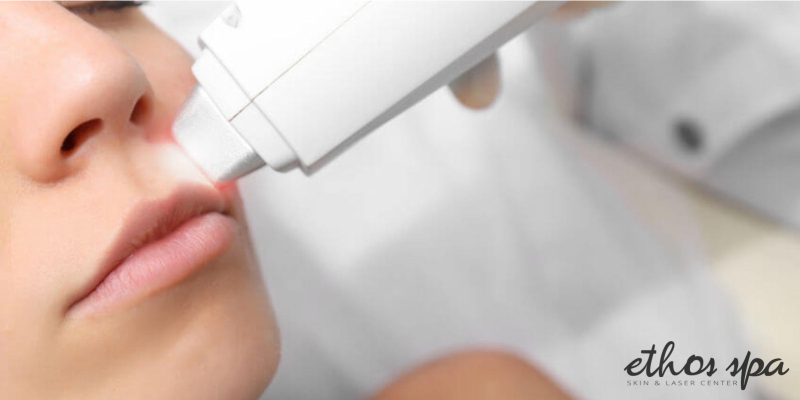
Picking the right way to remove chin hair is crucial because facial skin is a lot more delicate and sensitive than other parts of the body. The best way to get rid of coarse chin hair for women is to address the underlying medical cause, but simple solutions also help remove the chin hair without affecting the person’s health.
Here are eight effective ways to remove unwanted chin hairs:
| Pain Level | Is it DIY-safe? | |
| Tweezing | Low to Medium | Yes |
| Waxing | High | Sometimes |
| Shaving | Low | Yes |
| Threading | Medium to High | No |
| Depilatory Creams | Low to Medium | Yes |
| Epilation | Medium to High | Yes |
| Laser Hair Removal | High | No |
| Electrolysis | High | No |
- Tweezing – Plucking the stray hairs using tweezers is an easy and familiar way to remove unwanted facial hair. This method works best for smaller areas like the chin. Tweezers are also a lot cheaper than other tools and products used for hair removal. Just make sure to wipe the tips with alcohol before and after every use.
- Waxing – Another common method of body hair removal is waxing. It utilizes soft or hard wax to pull off the unwanted hair from its roots. A trained practitioner removes chin hairs quickly and safely, but it’s alright to try it at home if you’re familiar with the process. However, it’s also important to remember that wax may irritate sensitive skin in the facial area.
- Shaving – In addition to eliminating unwanted facial hair, this hair removal technique is also useful for exfoliation. But unlike waxing and tweezing that removes the hair follicle, shaving only cuts the stray hairs in half. The skin might feel prickly a few days after shaving because the hair is starting to regrow.
- Threading – This option is another great choice for removing hairs in small areas. Unlike tweezing that deals with solitary hairs, threading removes rows of hairs at once. This method utilizes a thin cotton thread pulled taut over the treatment area. However, this practice requires training so it’s better to head to a salon that offers threading services.
- Depilatory Creams – If you’re looking for a gentle way to remove unwanted chin hairs, depilatory creams might be the best choice. These creams are created with potassium or calcium thioglycolate that weakens the hair. Just apply the cream over the chin and wipe it clean. You’ll notice the unwanted hairs gone from the chin instantly.
- Epilation – This process utilizes a device that plucks multiple hairs in an area at once. Epilation is a lot more painful than tweezing but not as bad as waxing. Most women who try epilation eventually get used to the sensation. Aside from the chin, this device also works well in other areas like the underarms and the sides of the face.
- Laser Hair Removal – If you have the money for a more permanent hair removal solution, intense pulse light therapy is the right choice. This technique utilizes lasers that destroy the hair follicles without damaging the surrounding skin. This method should only be performed inside a clinic – laser hair removal at home leads to serious complications, such as hyperpigmentation, burns, and scars.
- Electrolysis – Another permanent hair removal option is electrolysis. Like laser hair removal, this method also utilizes heat to damage the hair follicles in the treatment area. Instead of working on a larger surface area, electrolysis focuses on one follicle at a time. What’s great about electrolysis is that it works well for women with light-colored hair.
Explore Hair Removal Options at Ethos Spa
Looking for a safe and permanent hair removal option for unwanted chin hairs? Here at Ethos Spa, we provide laser hair removal services that eliminate chin hair without damaging the skin. We only utilize the latest technology that works on all skin types and colors.
If you’re tired of frequent tweezing, shaving, and waxing sessions, it’s time to consider laser hair removal at Ethos Spa. Call us at (908) 628-1916 to schedule an appointment.

